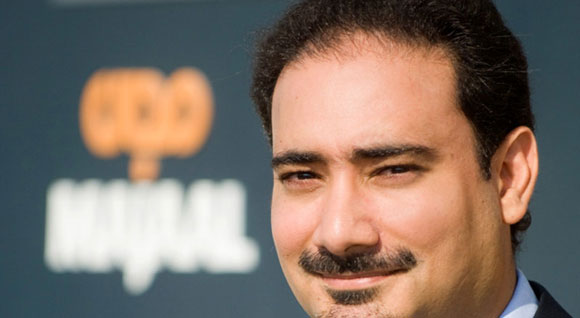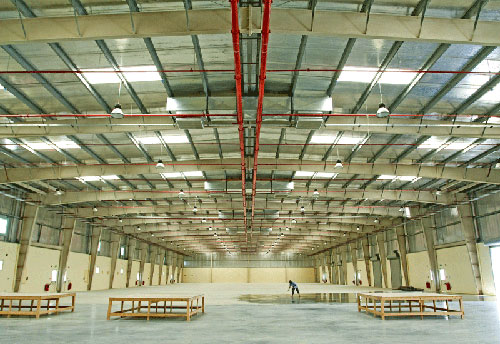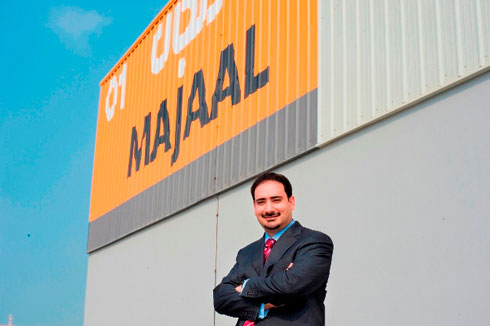First Bahrain Real Estate: Bahrain Industrial Real-Estate Project
Amin Al Arrayed, General Manager of First Bahrain Real Estate Development Company
Majaal is the first SME-focused warehousing facility in Bahrain. It’s never existed previously. If you were a large company involved in trade activity you would build your own warehouse, because you’d have the necessary resources.
Interview with Amin Al Arrayed, General Manager of First Bahrain Real Estate Development Company

Bahrain’s commercial real estate sector continues to suffer from massive over development in most sub-sectors. The general economic environment remains subdued and the growth of the sector is to remain sluggish into the medium term. The real estate has been hit hard by the global financial crisis. 30 billion $ were invested last year in projects, and demand has slowed down. Besides, the recent events that took place in Bahrain didn’t help. Could you describe the current climate of Bahrain’s real estate market for our readers and viewers?
Bahrain’s economy in general has gone through quite a few shocks over the past 5 years. We’ve seen quite a number of interesting developments that have indirectly impacted the economy, and particularly the real estate sector. Some areas within the real estate sector have been impacted much more than others.
Majaal
is the first
SME
-focused
warehousing
facility in Bahrain. It’s never existed previously. If you were a large company involved in trade activity you would build your own warehouse, because you’d have the necessary resources.
The investment sector and commercial sectors have been impacted quite heavily. The residential sector has also suffered a little bit, especially the free-hold high-rise development. On the other hand, there has still been strong growth on the industrial side which has helped counter the slump in the rest of the market. Industrial real estate, warehousing, industrial parks and logistics facilities; this sector is still performing well.
Looking forward, I think you will see significant growth within industrial real estate and middle income housing. These are two sectors that were somewhat neglected during the boom period. But I think that now that you have a slower economy, demand from the local population, more than outside speculation, will be driving the sector. 
Middle income housing, low to middle income residential communities, development of Bahrain’s industrial and logistics centers; these are sectors with high demand. The Salman Industrial City has been developing on the impulse of the government. Significant investment has been made.
For the year ended December 2010, First Bahrain reported profits of more than 84 000 KD, after experiencing losses in 2009. The improvement of the performance is a direct result of the company’s success in leasing the Majaal property. What is your strategy for this year?
Clearly when we started to operate Majaal as a company and we started to turn it from raw land into an income-generating property, its value was greatly enhanced. It was one of the main drivers for profitability in 2010.
Our strategy for this year is to capitalize on this investment. We want to expand Majaal both in Bahrain and outside thanks to a very aggressive expansion plan. One of the things we’ve developed as part of the Majaal concept is the ability to franchise the model and export it to other states within the GCC. Investors in Saudi Arabia, Oman and Qatar have all shown interest. We are currently discussing potential partnerships to replicate the Majaal concept in these countries.
Majaal is the first SME-focused warehousing facility in Bahrain. It’s never existed previously. If you were a large company involved in trade activity you would build your own warehouse, because you’d have the necessary resources. Smaller companies usually either resort to sub-standard warehouses, or buy a villa and turn it into a warehouse, which caused all sorts of problems regarding safety.
We found a very big supply gap in this area. We built Grade A specification warehousing with the same standards you would expect from a 3PL warehouse, but in smaller unit sizes to accommodate small companies better.
Nobody else on the market provides such small units with such high specifications. And that’s why we were able to lease out over 70% of the space in 2010. We consider this result to be a very big success story. We identified a gap in the market and were able to fill it. Now we are looking into other GCC countries’ markets and are finding similar opportunities.
What do you need exactly to expand to new countries? 
It’s very important that we have a strong partner in the country where we want to operate. It can really help in the development process, so we can streamline things like approvals, sourcing of contractors and other kinds of ventures; but more importantly it can help understanding the market itself.
We’re looking for strong local partners with experience and good understanding of the local market, and particularly, partners who share our vision (i.e. not purely financial partners).
In which stage are you in terms of finding partners in Saudi Arabia, the UAE, etc?
We’ve actually signed a MOU (Memorandum of Understanding) with a partner in Saudi Arabia and have identified other potential partners regionally. Saudi was a priority for us given the size of its market. We’re currently in advanced discussions in Qatar and Oman although we haven’t made any commitments yet. So we’re still looking.
How do you assess Bahrain’s ability to become a logistics hub, and replicate your model abroad?
Clearly there has been a significant push from the government to develop the Salman Industrial City. We knew that the government was closing down the old Mina-Salman port and opening the new Khalifa Bin Salman Port in that area, and that is one of the reasons why we started our project.
It was crucial for us to be near the new port. Another key advantage is our closeness to the airport: 5 minutes away from the airport and 2 minutes away from the port. As for the location of our project, the BIW (Bahrain Investment Wharf) was the exact place for us to be.
The other big advantage to following the government’s lead is that the government was very committed to providing the necessary infrastructure (road network, sewage, electricity, etc.) in a timely manner.
What major challenges are facing you at the moment?
Even when you are convinced your product will work, if the market is slow or if there is an apprehension of the people to invest or expand their operations, then they won’t need any extra space and extra facilities.
There are external factors like the recent political unrest that we’ve had to face that are also challenging for us. We were fortunate to have a few very good years in 2006, 2007, 2008, which allowed us to conserve enough liquidity. The losses that we had in 2009 came as a result of the world financial crisis which hit Bahrain in 2008. But we were able to overcome that since 2010 was profitable again for us. We react and adapt our strategy based on the circumstances.
Is there any new project under way that you would like to mention?
I think the big story for us in 2011 will be expansion. We’ve created a successful pilot project in Bahrain and demonstrated our ability to execute on the development side and create an income-generating product.
The project for us in 2011 will be to roll this out across the GCC. We may in addition to this activate some of our other projects. We have a 240,000 square foot plot in Janabiya, and a 239,000 square foot plot across from the City Center Mall in the Seef area.
What is your dream and your vision for your company and for Bahrain in 5 years?
It would be fantastic for us to have Majaal be the leader in SME warehousing across the GCC. It’s a very optimistic yet achievable goal. Our reputation has always been to deliver domestically demand-driven projects; real, fundamentals-driven projects.
I am also hoping for some of our other projects to show success soon. Real estate is typically a slow business: it takes time to develop and operate, it’s not a high transaction business; it’s about development, so 5 years isn’t such a long period of time. Rather than quantity, I hope for First Bahrain to develop a few key projects and create value through them.